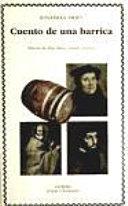“Vision is the Art of seeing Things invisible.”
Thoughts on various subjects (Further thoughts on various subjects) (1745)
Jonathan Swift was an Anglo-Irish satirist, essayist, political pamphleteer , poet and cleric who became Dean of St Patrick's Cathedral, Dublin, hence his common sobriquet, "Dean Swift".
Swift is remembered for works such as A Tale of a Tub , An Argument Against Abolishing Christianity , Gulliver's Travels , and A Modest Proposal . He is regarded by the Encyclopædia Britannica as the foremost prose satirist in the English language, and is less well known for his poetry. He originally published all of his works under pseudonyms – such as Lemuel Gulliver, Isaac Bickerstaff, M. B. Drapier – or anonymously. He was a master of two styles of satire, the Horatian and Juvenalian styles.
His deadpan, ironic writing style, particularly in A Modest Proposal, has led to such satire being subsequently termed "Swiftian".
Wikipedia

“Vision is the Art of seeing Things invisible.”
Thoughts on various subjects (Further thoughts on various subjects) (1745)
“Satire is a sort of glass, wherein beholders do generally discover everybody's face but their own.”
The Battle of the Books, preface (1704)
A Modest Proposal (1729)
“Pedantry is properly the over-rating of any kind of knowledge we pretend to.”
A Treatise on Good Manners and Good Breeding
The Tatler No. 63 (September 1709)
Thoughts on Various Subjects from Miscellanies (1711-1726)
Source: Abolishing Christianity and Other Essays
Source: The Battle of the Books and Other Short Pieces
“The best doctors in the world are Doctor Diet, Doctor Quiet, and Doctor Merryman.”
Polite Conversation (1738), Dialogue 2
Essay on the Fates of Clergymen (1728)
“I never wonder to see men wicked, but I often wonder to see them not ashamed.”
Thoughts on Various Subjects from Miscellanies (1711-1726)
“Men are contented to be laughed at for their wit, but not for their folly.”
Thoughts on Various Subjects from Miscellanies (1711-1726)
Thoughts on Various Subjects from Miscellanies (1711-1726)
The Drapier's Letters, letter iv (13 October, 1724)
Verses on the Death of Dr. Swift (1731), l. 459
Context: Yet malice never was his aim;
He lashed the vice but spared the name.
No individual could resent,
Where thousands equally were meant.
His satire points at no defect
But what all mortals may correct;
For he abhorred that senseless tribe
Who call it humor when they gibe.
“She wears her clothes, as if they were thrown on her with a pitchfork.”
Polite Conversation (1738), Dialogue 1
“May you live all the days of your life.”
Polite Conversation (1738), Dialogue 2
“Falsehood flies, and truth comes limping after it”
The Examiner No. XIV (Thursday, November 9th, 1710)
Context: Falsehood flies, and truth comes limping after it, so that when men come to be undeceived, it is too late; the jest is over, and the tale hath had its effect: like a man, who hath thought of a good repartee when the discourse is changed, or the company parted; or like a physician, who hath found out an infallible medicine, after the patient is dead.
“There is nothing in this World constant but Inconstancy”
A Tritical Essay upon the Faculties of the Mind (1707)
Context: ALL Rivers go to the Sea, but none return from it. Xerxes wept when he beheld his Army, to consider that in less than a Hundred Years they would be all Dead. Anacreon was' Choakt with a Grape-stone, and violent Joy Kills as well as violent Grief. There is nothing in this World constant but Inconstancy; yet Plato thought that if Virtue would appear to the World in her own native Dress, all Men would be Enamoured with her. But now since Interest governs the World, and Men neglect the Golden Mean, Jupiter himself, if he came on the Earth would be Despised, unless it were as he did to Danae in a Golden Shower. For Men nowadays Worship the Rising Sun, and not the Setting.
“Men nowadays Worship the Rising Sun, and not the Setting.”
A Tritical Essay upon the Faculties of the Mind (1707)
Context: ALL Rivers go to the Sea, but none return from it. Xerxes wept when he beheld his Army, to consider that in less than a Hundred Years they would be all Dead. Anacreon was' Choakt with a Grape-stone, and violent Joy Kills as well as violent Grief. There is nothing in this World constant but Inconstancy; yet Plato thought that if Virtue would appear to the World in her own native Dress, all Men would be Enamoured with her. But now since Interest governs the World, and Men neglect the Golden Mean, Jupiter himself, if he came on the Earth would be Despised, unless it were as he did to Danae in a Golden Shower. For Men nowadays Worship the Rising Sun, and not the Setting.
“ALL Rivers go to the Sea, but none return from it.”
A Tritical Essay upon the Faculties of the Mind (1707)
Context: ALL Rivers go to the Sea, but none return from it. Xerxes wept when he beheld his Army, to consider that in less than a Hundred Years they would be all Dead. Anacreon was' Choakt with a Grape-stone, and violent Joy Kills as well as violent Grief. There is nothing in this World constant but Inconstancy; yet Plato thought that if Virtue would appear to the World in her own native Dress, all Men would be Enamoured with her. But now since Interest governs the World, and Men neglect the Golden Mean, Jupiter himself, if he came on the Earth would be Despised, unless it were as he did to Danae in a Golden Shower. For Men nowadays Worship the Rising Sun, and not the Setting.
“I said the thing which was not.”
For they have no word in their language to express lying or falsehood.
Voyage to Houyhnhnms, Ch. 3
Gulliver's Travels (1726)
“Books, the children of the brain.”
Sect. 1
A Tale of a Tub (1704)
Source: A Tale Of A Tub And Other Writings
“We have just enough religion to make us hate, but not enough to make us love one another.”
Thoughts on Various Subjects from Miscellanies (1711-1726)
“Every man desires to live long, but no man would be old.”
Thoughts on Various Subjects from Miscellanies (1711-1726)
Variant: All would live long, but none would be old.
Source: Gulliver's Travels
“Reasoning will never make a man correct an ill opinion, which by reasoning he never acquired…”
Letter to a Young Clergyman (January 9, 1720), on proving Christianity to unbelievers
“Laws are like Cobwebs which may catch small Flies, but let Wasps and Hornets break through.”
A Tritical Essay upon the Faculties of the Mind (1707)
Context: Laws are like Cobwebs which may catch small Flies, but let Wasps and Hornets break through. But in Oratory the greatest Art is to hide Art.
Voyage to Brobdingnag, Ch. 6
Source: Gulliver's Travels (1726)
“Libertas et natale solum:
Fine words! I wonder where you stole 'em.”
Verses Occasioned by Whitshed's Motto on his Coach (1724); the Latin indicates "liberty and my native land", and Whitshed was a chief justice enraged by The Drapier's Letters
“Proper words in proper places, make the true definition of a style.”
Letter to a Young Clergyman http://www.online-literature.com/swift/religion-church-vol-one/7/ (January 9, 1720)
“No wise man ever wished to be younger.”
Thoughts on Various Subjects from Miscellanies (1711-1726)
Alexander Pope, Thoughts on Various Subjects (1727), Published in Swift's Miscellanies (1727)
Misattributed
Variant: A man should never be ashamed to own he has been in the wrong, which is but saying in other words, that he is wiser today than he was yesterday.
Thoughts on Various Subjects from Miscellanies (1711-1726)
Thoughts on Religion (1765), published posthumously
Christian Nestell Bovee, in Intuitions and Summaries of Thought (1862), Volume I, p. 124
Misattributed
Preface
A Tale of a Tub (1704)
“Tis very warm weather when one's in bed.”
Journal to Stella (November 8, 1710)
On the Emperor of Lilliput, in Voyage to Lilliput, Ch. 2
Gulliver's Travels (1726)
“I love good creditable acquaintance; I love to be the worst of the company.”
Journal to Stella (May 17, 1711)
Voyage to Houyhnhnms, Ch. 5
Gulliver's Travels (1726)
Voyage to Brobdingnag, Ch. 7 https://en.wikisource.org/wiki/Gulliver%27s_Travels/Part_II/Chapter_VII
Gulliver's Travels (1726)
Imitation of Horace, book ii. Sat. 6.; reported in Bartlett's Familiar Quotations, 10th ed. (1919)
Thoughts on Various Subjects from Miscellanies (1711-1726)
“You beat your pate, and fancy wit will come;
Knock as you please, there's nobody at home.”
On a Dull Writer, reported in John Hawkesworth, The Works of Jonathan Swift, D.D., Dean of St. Patrick's, Dublin (1754), p. 265. Alternately attributed to Alexander Pope by Bartlett's Quotations, 10th Edition (1919). Compare: "His wit invites you by his looks to come, But when you knock, it never is at home", William Cowper, Conversation, line 303
Disputed
“As love without esteem is volatile and capricious; esteem without love is languid and cold.”
John Hawkesworth, The Adventurer, No. 36 (10 March, 1753)
Misattributed
“…one enemy can do more hurt, than ten friends can do good.”
Journal to Stella (30 June, 1711)



